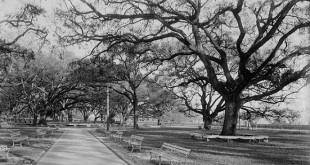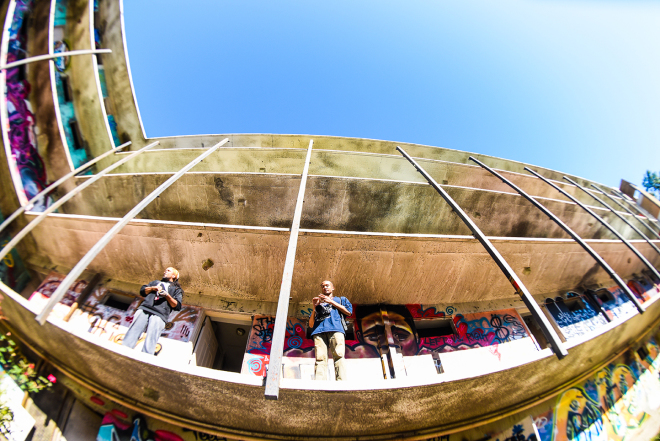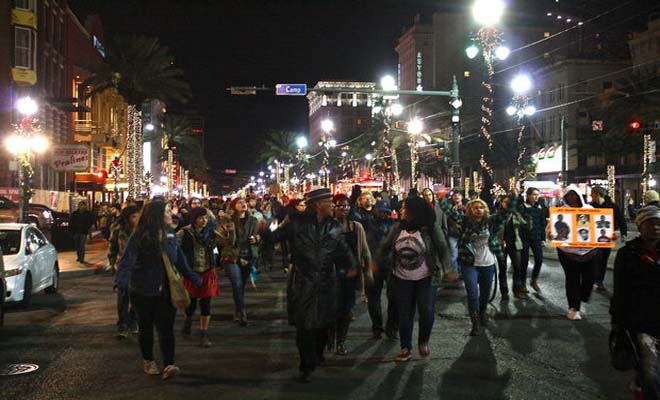Community revitalization efforts go beyond big names in the Ninth Ward—trade Pitt for Young— as Capstone Community Garden provides neighborhood grown produce as well as a stable community environment to any who walk through its many open doors.

Located on Lizardi St., just a few blocks away from the levee and Industrial Canal, the Capstone House sits nestled between a row of hand-constructed beehives and an abandoned brick house, which the group uses to store bicycles. Offering room to three permanent residents, including founder David Young and long-term volunteer Tyler Goss, the converted shotgun double is far from the average farmhouse. With a goat, duck, and chicken run out back and a saltwater fish tank in the living room, the Capstone headquarters also houses a rotating host of volunteer farmers and community workers, many through WWOOF (Worldwide Opportunities on Organic Farms) programs, couchsurfing, churches and business groups.

According to Goss, Capstone’s first gardening initiative, now lovingly called “The Garden,” was founded out of an aborted attempt to build a house. In 2010, while Mr. Young worked with both skilled and unskilled local workers on the building project, produce began to disappear from the onsite garden. Realizing a need in the surrounding community, Young converted the site into a community garden with a goal to provide fresh, sustainable produce to any in need.
Now, nearly four years later, The Garden is just one of 26 converted gardening lots operated by Capstone and its volunteer farmers in the Ninth Ward.
“I typically work in the mornings, and Tyler works all day,” said Alice Shockey, a volunteer WOOFer from New Jersey. “We’re out of harvesting now, so we’ve been doing a lot of prep work for the coming season.”

A day in the life of a Capstone volunteer, she said, may include farm usuals like tilling and weeding, but at Capstone its sometimes necessary to go the extra mile, breaking through concrete housing foundations in order to reach arable soil. The product of such work at a plot like “The Farm,” a converted lot on Lamanche St., amounts to rows and rows of plant beds, two greenhouses built from recycled materials, and a healthy collection of bee hives.
“The bees are great for pollinating the plants,” Goss explained, “and, in order to offset some costs, we sell the honey at market. Everything else is completely free.”
In this way, Capstone has remained faithful to its first days, producing and distributing around 650 lbs of produce this year to those in need with more food to come.
“We’re committed to trying out new methods of growing and partnering with community members” Goss said, walking through “The Orchard” lot, which is named for the rows of new fruit trees that it contains. Built with volunteer work and grant money from PitchNola, The Orchard exemplifies Mr. Young’s tenacity and commitment to community support. “When neighbors asked him for fruit,” Goss said, “he made it happen.”
A retired police chief from Indiana, Mr. Young now spends his time either working in Capstone gardens or advocating for his

neighbors in local fora. With Goss and other Capstone volunteers, he also leads weekly meetings for teens in the St. Bernard Parish Prison. The program, called Teen Jail Ministry, is an open and teen lead discussion that seeks to provide prisoners with mentorship and thoughtful consideration.
While the gardening is seasonal, Capstone remains hard at work. Back at the farmhouse, more projects are ramping up, like a partnership with the neighborhood’s first post-Katrina grocery Galvez Goodies, and Gyro, the new baby goat, is just starting to show some horns.
“When he first got here,” Goss said, speaking of Mr. Young, “the first thing he did was put up a mailbox to say I’m listening, I’m here to stay.”

And, with the project expanding to more Ninth Ward lots and drumming up a significant amount of interest from not only volunteers but neighbors, too, it seems he’s right.
Know of any other awesome community organizations? Let us know in the Comments Section!




